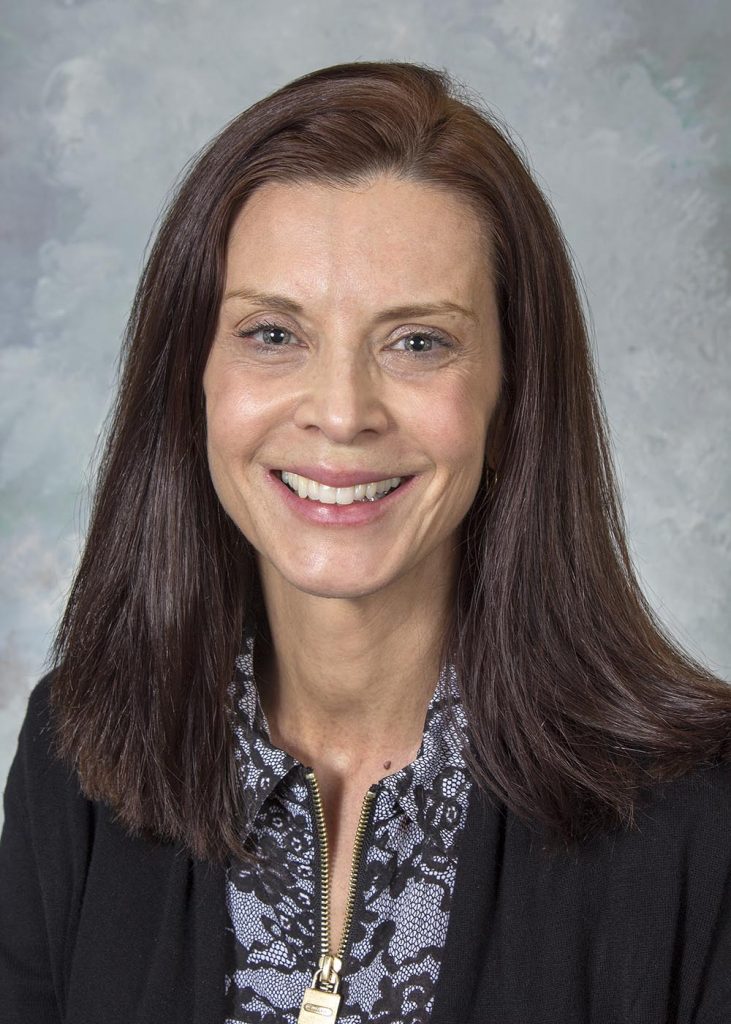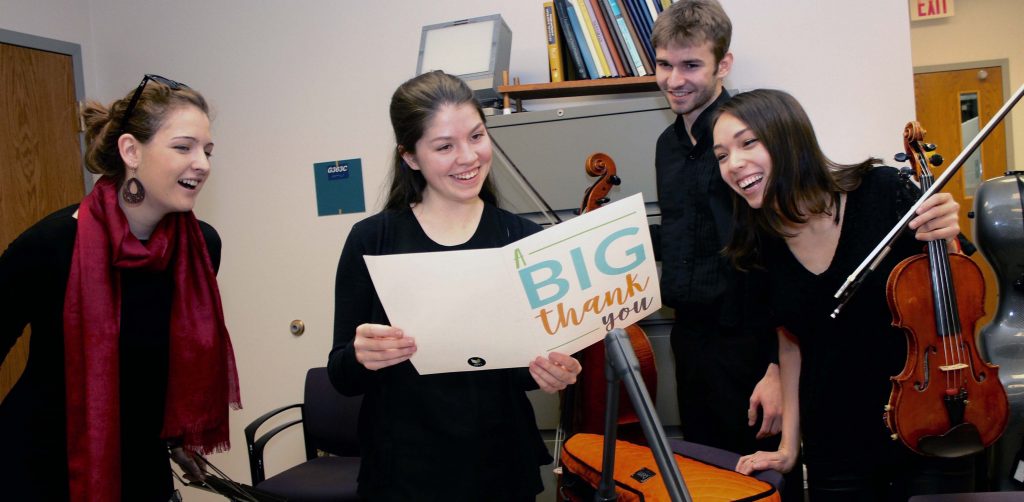Campus Collaboration: Music Therapy for Dental Students7 min read
UMS Grant, Music Students Help Dentistry Professor Research Stress

Ann Arbor, Mich., May 22, 2018 -– Can a stringed quartet playing beautiful classical music soothe the stressed-out dental student? Or perhaps even improve student performance on tests and other difficult dentistry procedures?
A School of Dentistry faculty member is researching those questions in a campus collaboration with the University Musical Society and the School of Music, Theatre and Dance.

Using a grant from UMS, Professor Elisabeta Karl invited four music performance students from the music school to perform for a lecture hall audience of more than 100 dental students on three occasions during the winter semester. Each half-hour concert, which Karl calls music therapy, was timed to precede a particularly difficult exam or skill competence assessment. Both before the performances and after, students were asked to rate their stress levels on a widely-used questionnaire that measures anxiety.
Karl is still analyzing the results, but preliminary findings showed near unanimous reduction of anxiety after the students relaxed during the concerts and as they headed to their next class assignment. The early analysis of two key questions – students feeling very much worried or feeling very much content – produced an impressive difference before and after the music. “In the beginning, before the music therapy, we had around 25 to 30 percent of the class reporting themselves as very much worried, and only 6 percent of the class reported themselves as content individuals,” Karl said. “After the music therapy sessions, we saw a big shift: 33 percent of the class reporting themselves as very content and only 5 percent being very worried.” Overall, 89 percent of the dental students said they enjoyed the musical performance sessions and would like to have them again.
The next step will be to see if calmer, less anxious students translate into better exam grades or improved performance on dental skill tests. “Grades were never my concern,” Karl said, “but it would be good to see if maybe the students do better because they were calmer. It doesn’t mean that you’re going to listen to music and everything’s going to be easy. No. But things are easier when you are in a better spirit. If you are content, you perform better. I think they all saw how much that disconnecting for a few minutes was good for them.”
Student Patrick Lucas-Perry, now beginning his second year at the dental school, said it’s impossible to escape the pressure of, for example, having 10 final exams in 10 days or the precise tolerances professors require on certain dental procedures. “They’re very particular in how they want things. You are looking at millimeters for dimensions, so it’s kind of stressful,” he said. “I like to think of myself as a stress-free type of person, but having the music kind of calmed me down. It kind of took me away from being in dental school and worrying about the different things I need to know for the practical (tests). It kind of put me at ease and I really liked it.”
The student musicians – violinists Teagan Faran and Rose Brown, violist Aimee McAnulty and cellist Michael Berg – said they loved the opportunity to play for an audience of fellow students, particularly since their job was to provide relaxing music. Faran said the group carefully chose composers and music in the first session that would be familiar to their non-musician audience, but they also mixed in some lesser-known composers and some less-traditional classical music as a sort of “suggested listening” play list for the dental students. The programs included works by Mozart, Tchaikovsky, Josquin, Dvorak, Mendelssohn, Glass and Pärt. Faran introduced each piece and described its subtleties, including the fact that composer Alexander Borodin was, like the dental students, a healthcare provider because he was also a doctor.
Faran said she is intrigued by the idea of music therapy helping reduce anxiety in students. “I’ve found that being able to engage cognitively in another task can help to alleviate stress in other activities. It is definitely a topic I would love to explore more – hopefully with the dental school,” she said.
The collaboration between the dental school and SMTD may continue because Karl has applied for an extension of her grant from UMS. Shannon Fitzsimons Moen, a campus engagement specialist with UMS, said this is the second year of the Course Development Grant Program, available to faculty across campus who want to integrate the arts into their curriculum. UMS funds 5-8 courses per semester, providing faculty fellows with $1,000 in salary supplement and $500 in course development funds. The program is part of an ongoing grant from the Andrew W. Mellon Foundation. The current focus is to more broadly and intentionally integrate UMS and arts-based learning strategies into the curriculum across the university. It’s not a new emphasis for UMS, which, since 1879, has a longstanding tradition of sponsoring arts education throughout the Ann Arbor and university communities in addition to its mission as a world-class performing arts presenter.

and Teagan Faran laugh at some of the funny lines used by dental
students who signed a thank-you card after the last concert at the
School of Dentistry.
Moen helped Karl structure the music therapy program and recruited the students from SMTD. As she attended the final concert, Moen said she was impressed by how the music students crafted their program, and explained it, for the dental students. “They were thinking about the ways in which music and medicine, and music and wellness, can intersect within people’s lives,” Moen said. “And the dental students were using music as part of their educational experience rather than sitting there stressing out before these very intense exams and tests. The dental students had an opportunity to engage with something from a different discipline, perhaps tune in with another part of the mind other than what they will engage in the exam in a few minutes. I thought it was just a really wonderful way to bridge those disciplines in an unexpected way.”
Karl, a clinical assistant professor in the Department of Cariology, Restorative Sciences and Endodontics, said the music therapy project fit well with her interest in interprofessional education and previous research on non-pharmacological and alternative approaches to reducing student anxiety through methods such as breathing exercises and art therapy. As one of 21 U-M educators named to the 2018 Interprofessional Leadership Fellows Program, Karl said the music project was an excellent example of the interprofessional collaboration between the three campus units – dentistry, SMTD and UMS. “I knew it was going to be something different, but I could never imagine that we would find this engagement of music students and dental students,” she said. “It was a very rewarding experience to see 108 students standing up and clapping for the music students.”
###
The University of Michigan School of Dentistry is one of the nation’s leading dental schools engaged in oral health care education, research, patient care and community service. General dental care clinics and specialty clinics providing advanced treatment enable the school to offer dental services and programs to patients throughout Michigan. Classroom and clinic instruction prepare future dentists, dental specialists, and dental hygienists for practice in private offices, hospitals, academia and public agencies. Research seeks to discover and apply new knowledge that can help patients worldwide. For more information about the School of Dentistry, visit us on the Web at: www.dent.umich.edu. Contact: Lynn Monson, associate director of communications, at [email protected], or (734) 615-1971.
